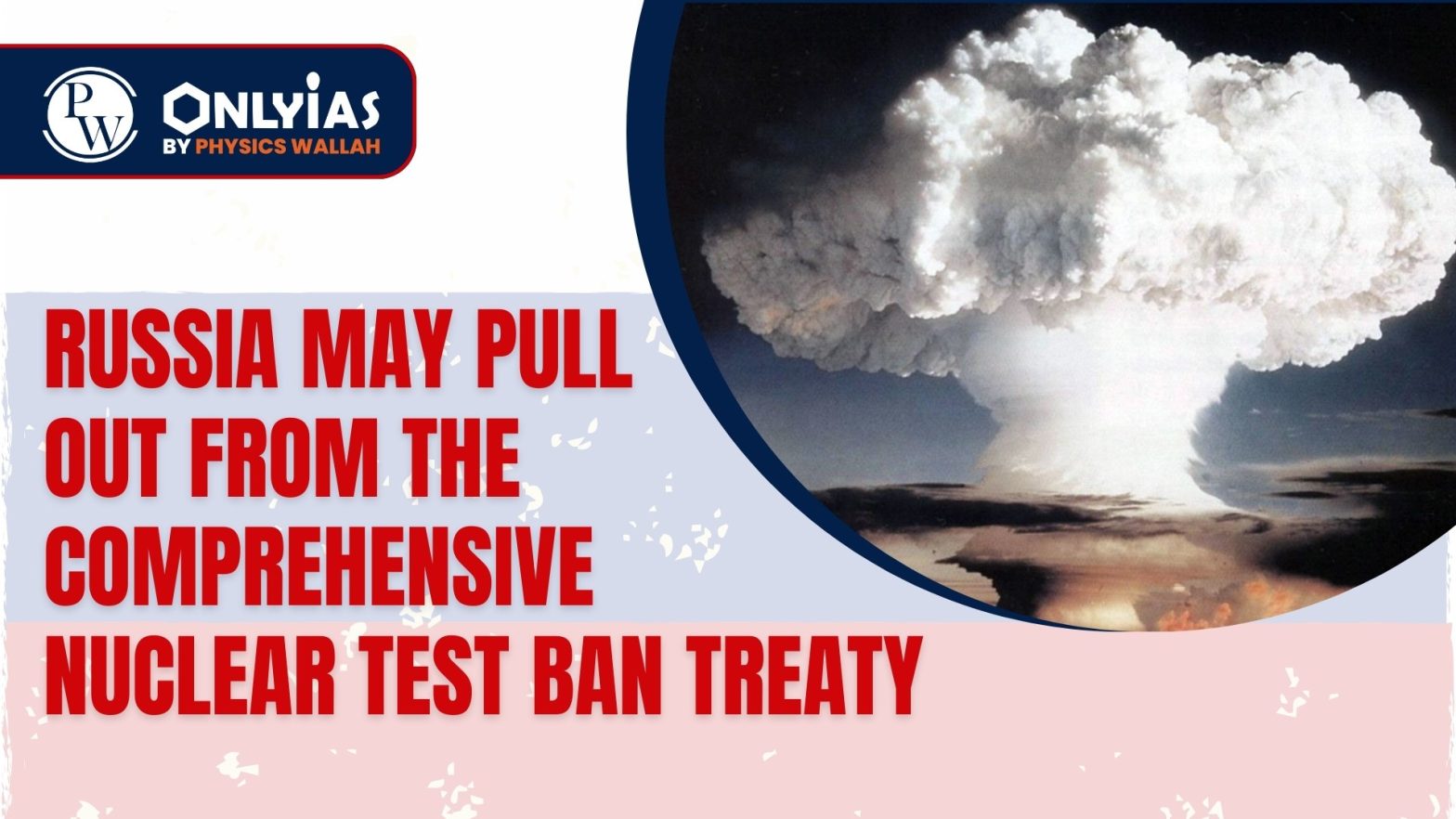Context:
| Relevancy for Prelims: Comprehensive Nuclear Test Ban Treaty and Treaty of Non-Proliferation of Nuclear Weapons, and India-Middle East-Europe Corridor’s Transformative Potential.
Relevancy for Mains: Comprehensive Nuclear Test Ban Treaty (CTBT Dilemma): Russia’s Exit Sparks Global Nuclear Test Fear, and Treaty of Non-Proliferation of Nuclear Weapons and its associated concerns with reference to India. |
What is the Comprehensive Nuclear Test Ban Treaty?
- Comprehensive Nuclear Test Ban Treaty or CTBT is a multilateral treaty: Negotiated at the Conference on Disarmament in Geneva, which bans all nuclear explosions, whether for military or peaceful purposes.
- Associated Members: The CTBT has been signed by 187 countries and ratified by 178 but cannot go into force until eight countries have signed and ratified it.
- China, Egypt, Iran, and Israel have signed but not ratified it. North Korea, India and Pakistan have not signed. While Russia ratified the agreement in 2000, the US is still to do so.
- Significance: It has an important role in ensuring a world where nuclear weapons tests are barred and thus constrain the development of new nuclear weapons and new nuclear weapon countries.

Also read: Nuclear Supplier Group (NSG)
What consequences might arise if Russia decides to withdraw from the Comprehensive Nuclear Test Ban Treaty?
- Global Disarmament: It would be a big setback to the Nuclear disarmament movement.
- Nuclear Arms Race: This move would enable Russia to build and deploy more nuclear weapons which would result in a dangerous arms race.
- Russia-Ukraine Crisis: The present Russian decision has aggravated the missile attacks against each other and escalated the crisis further.
- Russia-West Relations: The Russian decision wants to pressurize the West by sending an ambiguous message strategically by putting all the blame on the US, this will further erode Russia and West ties.
- Global Politics and Security: Now, many countries like North Korea, Pakistan, Turkey, Iran, and China may go for further proliferation of nuclear weapons without any scrutiny.
- Undermining Future Agreements: If Russia revokes its ratification –Comprehensive Nuclear Test Ban Treaty, it will leave the world without a common starting point for future efforts.
What is India’s stance on the matter of Global Nuclear Disarmament?
- Complete Disarmament: India has consistently advocated global nuclear disarmament since the concept’s inception in the United Nations.
- Universal Non-discriminatory and verifiable Treaty: India remains committed to negotiating a universal, non-discriminatory and internationally and effectively verifiable treaty banning the production of fissile material for nuclear weapons or other nuclear explosive devices.
- Delinking Disarmament and Non-Proliferation: In 1965, India was a member of the eighteen nation disarmament committee (ENDC) that advocated for delinking disarmament and non-proliferation.
- India opposed the signing of the NPT (Treaty of Non-Proliferation of Nuclear Weapons which it views as discriminatory (dividing the world into Nukes haves and haves not).
- In 1988, India Proposed a Comprehensive Proposal for complete Universal disarmament (Rajiv Gandhi Action Plan)- to the UN General Assembly Special Session on Disarmament.
What are India;’s views on the Comprehensive Nuclear Test Ban Treaty?
- India has declared that it would be unable to sign and ratify the Comprehensive Nuclear Test Ban Treaty in its discriminatory form.
- The Post 1998 Pokhran test India stipulated its Nuclear doctrine in 2003 and reiterated its commitment to complete disarmament.
- India has pledged to continue its voluntary and unilateral moratorium on further nuclear testing.
- India believes that this Treaty does not constitute or contribute to the development of customary international law; nor does it set any new standards or norms.
|
Also read: UNGA’s 78th Session: Promoting Peace, Prosperity, and Sustainability
Conclusion
Considering the present pessimistic environment, the Russian revocation of the Comprehensive Nuclear Test Ban Treaty (CTBT) may not seem shocking or startling. Still, it is unfortunate for arms control efforts. In this regard, India supports the commencement of negotiations on a comprehensive Nuclear Weapons Convention in the Conference on Disarmament, which is the world’s single multilateral disarmament negotiating forum working on the basis of consensus.
| Attempt the PY Prelims Question
What is/are the consequence/consequences of a country becoming the member of the ‘Nuclear Suppliers Group’?
- It will have access to the latest and most efficient nuclear technologies.
- It automatically becomes a member of “The Treaty on the Non-Proliferation of Nuclear Weapons (NPT)”.
Which of the statements given above is/are correct?
- 1 only
- 2 only
- Both 1 and 2
- Neither 1 nor 2
Ans: A |
![]() 9 Oct 2023
9 Oct 2023

